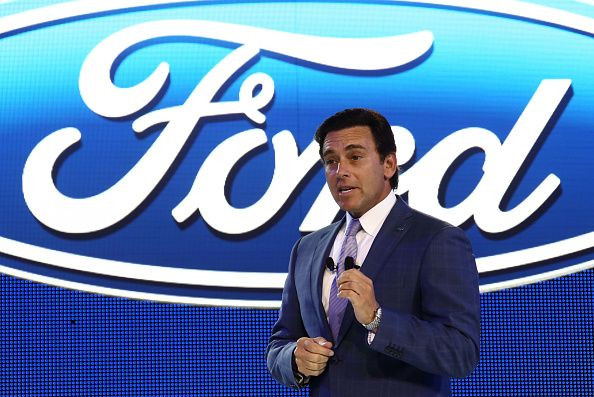Ford Motor Company (F) Earnings: Blue Oval Pushes Hard On ‘Future Of Mobility’

When Ford showed up earlier this month at the 2016 Detroit Auto Show, the public was gearing up for yet another splashy vehicle unveil under high-tech stage lighting and pounding music. After all, this was the same stage where the automaker had wowed audiences last year with the sexy 2017 Ford GT, the rear-engine two-seat supercar that’s heading to Le Mans in June. The year before, show attendees ogled the rust-proof aluminum-body F-150 pickup truck, Ford’s radical change to the country’s long-standing best-selling vehicle.
Instead, Ford’s biggest announcement this year to thousands of car enthusiasts was an app: FordPass, the company’s smartphone-based customer-engagement program that will go online in March.
“Ford is trying to be a forward-thinking mobility company, but the problem is nobody really knows yet what that entails,” said Jessica Caldwell, senior automotive analyst for Edmunds.com. “Automakers are always criticized for being late to the game, and that’s what’s prodding them to act.”
The app comes after Ford spent much of the past year touting its “blueprint for mobility” and will likely present more about this vision for the way people will move around when it reports its earnings for the fourth quarter and full-year 2015 on Thursday before the markets open. Consumers should expect to hear about Ford’s efforts in areas such as electrification, autonomous driving and vehicle-to-vehicle communications.
Analysts polled by Thomson Reuters expect Ford (NYSE:F) to report in the three months ending in December unadjusted earnings per share of 49 cents on $1.94 billion in profit, up from 1 cent per share on $52 million in profit in the same period the previous year. Before Ford took one-time charges the fourth quarter of 2014 related to cutting production in Europe and introducing a record number of vehicles, Ford earned 26 cents on $1.05 billion.
FordPass is just one facet of the Dearborn, Michigan-based company’s efforts to stay in the game as tech giants Google and Apple appear poised to elbow their way into the industry. The automaker has been quietly experimenting with new forms of mobility in various points across the globe.
“Ford talked about FordPass at the Detroit show, but it also has car-sharing experiments all over the world,” said Stephanie Brinley, senior analyst at IHS Automotive. “They’re doing this with very scientific-oriented projects and contained experiments.”
One example: Brinley says Ford is studying stuff like geomapping in emerging countries and how road conditions affect emergency healthcare transport in rural Africa and India. “It’s not that they’re necessarily going into that business,” she said, “but [investing in] how to learn about challenging markets.”
Ford’s latest earnings come as the U.S. is entering what could be the seventh consecutive year of growth in new-auto sales. As many as 17.5 million new cars, trucks and SUVs are expected to roll off dealership lots this year, up from 10.4 million in 2009, which was the lowest in nearly three decades. But auto analysts say auto sales will likely top off this year and then begin dropping in 2017, giving more reason for automakers to position themselves with services that can help supplement revenue and boost sales as the marketplace becomes more competitive.
© Copyright IBTimes 2024. All rights reserved.






















